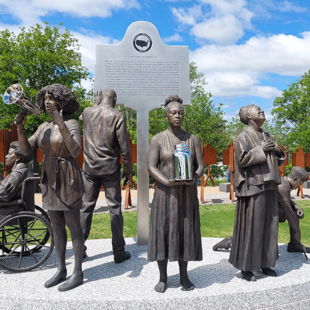“The Past is Never Dead”: U.S. Perspectives on History, Memory, and Current Challenges
We kindly invite you to the hybrid panel discussion at the Amerikahaus: March 28, 2025, at 7pm.
28.03.2025
About the Hybrid Panel Discussion
 As the American novelist William Faulkner famously wrote in 1951: “The past is never dead. It’s not even past.” Just like Germany, the United States has tried to come to terms with a difficult past – a legacy of slavery and segregation, inequality, discrimination, and violence. There are many controversies about how to teach, narrate, and remember history, about what has been remembered, forgotten, or distorted and what impact that still has today. In the past few decades, new museums and memorial sites have been opened that offer a much more critical and inclusive history, while many Confederate monuments have been taken down and places have been renamed. Nevertheless many Confederate monuments still have not been taken down and places still have not been renamed. And there has been a backlash against building a critical memory and transitioning from denial to collective responsibility. With the new Trump administration, some institutions are even under attack.
As the American novelist William Faulkner famously wrote in 1951: “The past is never dead. It’s not even past.” Just like Germany, the United States has tried to come to terms with a difficult past – a legacy of slavery and segregation, inequality, discrimination, and violence. There are many controversies about how to teach, narrate, and remember history, about what has been remembered, forgotten, or distorted and what impact that still has today. In the past few decades, new museums and memorial sites have been opened that offer a much more critical and inclusive history, while many Confederate monuments have been taken down and places have been renamed. Nevertheless many Confederate monuments still have not been taken down and places still have not been renamed. And there has been a backlash against building a critical memory and transitioning from denial to collective responsibility. With the new Trump administration, some institutions are even under attack.
The event is part of a comparative project titled “Building a Critical Memory: Transitioning from Denial to Collective Responsibility in Germany and the United States.”
A group of about 50 scholars and teachers, curators and educators from museums and memorial sites, other public historians, people working in foundations and NGOs as well as journalists from both countries is currently on a joint tour in Germany and will – later this year – be in the United States.
Moderator: Dr. Andreas Etges, Amerika-Institut, LMU München
Photo: National Memorial for Peace and Justice in Montgomery ©Irmgard Zündorf



